
Leslie Sebastian Charles, known professionally as Billy Ocean, is a Trinidadian-born British singer and songwriter. Between 1976 and 1988, he had a series of hit songs in the UK and internationally.

"Crazy Little Thing Called Love" is a song by the British rock band Queen. Written by Freddie Mercury in 1979, the track is included on their 1980 album The Game, and also appears on the band's compilation album Greatest Hits in 1981. The song peaked at number two in the UK Singles Chart in 1979 and became the group's first number-one single on the Billboard Hot 100 in the US in 1980, remaining there for four consecutive weeks. It topped the Australian ARIA Charts for seven weeks. It was the band's final single release of the 1970s.

"All Night Long (All Night)" is a song by American singer and songwriter Lionel Richie from his second solo album, Can't Slow Down (1983). The song combined Richie's Commodores style with Caribbean influences. The single reached number one on three Billboard charts (pop, R&B and adult contemporary). In the UK, it peaked at number two on the singles chart.

Reckless is the fourth studio album by Canadian singer-songwriter Bryan Adams, released by A&M Records on 5 November 1984 to coincide with Adams' 25th birthday. Like its predecessor Cuts Like a Knife, the album was entirely produced by Adams and Bob Clearmountain.

"I Just Called to Say I Love You" is a ballad written, produced, and performed by American R&B singer and songwriter Stevie Wonder. It was a major international hit, and remains Wonder's best-selling single to date, having topped a record 19 charts.

"Nightshift" is a 1985 song by the Commodores and the title track from their album of the same name. The song was written by lead singer Walter Orange in collaboration with Dennis Lambert and Franne Golde as a tribute to soul/R&B singers Jackie Wilson and Marvin Gaye, both of whom died in 1984. The song was released as the album's first single in January 1985 by Motown Records. "Nightshift" was recorded in 1984 and became the Commodores' first hit after Lionel Richie's departure from the group.
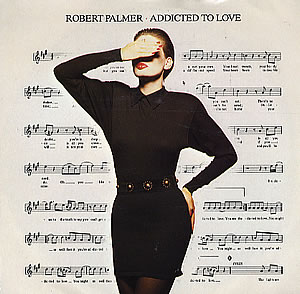
"Addicted to Love" is a song by English rock singer Robert Palmer released in 1986. It is the third song on Palmer's eighth studio album Riptide (1985) and was released as its second single. The single version is a shorter edit of the full-length album version.

"Somebody to Love" is a song by the British rock band Queen, written by lead singer and pianist Freddie Mercury. It debuted on the band's 1976 album A Day at the Races and also appears on their 1981 compilation album Greatest Hits.

"The Wild Boys" is the twelfth single by English pop rock band Duran Duran, released on 26 October 1984 in the United Kingdom.

"Love Is a Battlefield" is a song by American singer Pat Benatar, recorded and released on September 12, 1983, as a single from Benatar's live album Live from Earth (1983), though the song itself was a studio recording. It was written by Holly Knight and Mike Chapman. The song was ranked at number 30 in VH1's list of the 100 Greatest Songs of the 1980s. "Love Is a Battlefield" went on to sell over a million records.
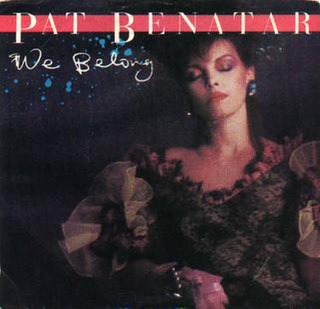
"We Belong" is a song recorded by American rock singer Pat Benatar, released through Legacy Music Group on October 16, 1984, as the lead single from her fifth studio album, Tropico (1984). The song was written by the songwriting duo of Eric Lowen and Dan Navarro. It matched the success of "Love Is a Battlefield" on the Billboard Hot 100 singles chart in the United States, peaking at #5. It reached #3 on Billboard's Top Rock Tracks chart and #34 on the Adult Contemporary chart.
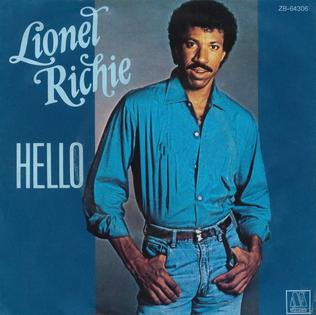
"Hello" is a song by American singer and songwriter Lionel Richie. Taken as the third single from his second solo album, Can't Slow Down (1983), the song was released in 1984 and reached number one on three Billboard music charts: the pop chart, the R&B chart, and the Adult Contemporary chart. The song also went to number one on the UK Singles Chart for six weeks.

"Sexcrime " is a song written and performed by the British duo Eurythmics. It was released as the first single from their album 1984 , which served as the soundtrack to the film Nineteen Eighty-Four, an adaptation of the novel of the same name by George Orwell. The song was produced by Dave Stewart.
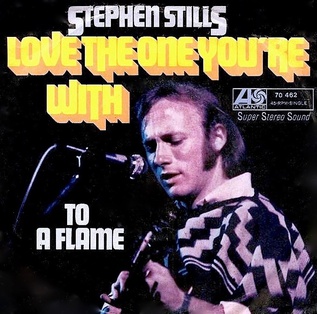
"Love the One You're With" is a song by American folk rock musician Stephen Stills. It was released as the lead single from his debut self-titled studio album in November 1970. The song, inspired by a remark Stills heard from musician Billy Preston, became his biggest hit single, peaking at No. 14 on the Billboard Hot 100 in early 1971. David Crosby and Graham Nash, Stills' fellow members of Crosby, Stills & Nash, provide background vocals on the song. Also providing the backups are Rita Coolidge, her sister Priscilla Jones, and John Sebastian. They all sing the "Do Dos" that come before the instrumental portion and the Outro. The song was also recorded by the Isley Brothers, The Meters, Bucks Fizz, Luther Vandross, Bob Seger and Richard Clapton, among others.

"There'll Be Sad Songs (To Make You Cry)" is a song by English singer Billy Ocean from his sixth studio album, Love Zone (1986). The song was written and produced by Wayne Brathwaite and Barry Eastmond; Ocean was also credited as a co-writer for the song. The song reached number one on the Billboard Hot 100 for the week beginning 5 July 1986, where it remained for one week, becoming the 600th different song to ascend to that position. It also topped the adult contemporary and R&B charts in the United States that same summer.

Suddenly is the fifth studio album by British singer Billy Ocean, released on 12 September 1984 by Jive Records. It featured his first major US pop hit single "Caribbean Queen ", which reached number one on the Billboard Hot 100. Prior to that, his biggest success on the US charts had been a number-22 placing for "Love Really Hurts Without You" in 1976, which was one of a number of UK hits he had achieved by the release of this album. Despite these earlier hits, Suddenly became Ocean's first charting album in the United Kingdom, reaching number nine on the UK Album Chart. It also reached number nine in the US, and spawned two additional US top-five singles in the title track and "Loverboy", while a fourth single, "Mystery Lady", reached the US top 40. "Caribbean Queen" and "Suddenly" also reached the top 10 of the UK Singles Chart.

"Suddenly" is a song from 1985 co-written and performed by UK-based singer Billy Ocean. Co-written and produced by Keith Diamond, it is the title track to Ocean's 1984 breakthrough album.

"Love Really Hurts Without You" is a song recorded by British R&B recording artist Billy Ocean. The song – written by Ocean under his real name Leslie Charles with the track's producer Ben Findon – was the second single recorded in the name Billy Ocean and provided Ocean with his first chart record in 1976.

"When the Going Gets Tough, the Tough Get Going" is a 1985 song co-written and originally recorded by English singer Billy Ocean in 1985.
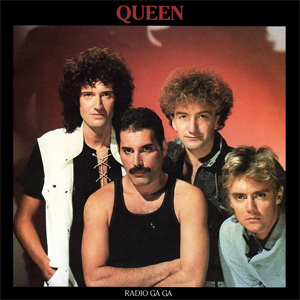
"Radio Ga Ga" is a 1984 song performed and recorded by the British rock band Queen, written by their drummer Roger Taylor. It was released as a single with "I Go Crazy" by Brian May as the B-side. It was included as the opening track on the album The Works and is also featured on the band's compilation albums Greatest Hits II and Classic Queen.




















